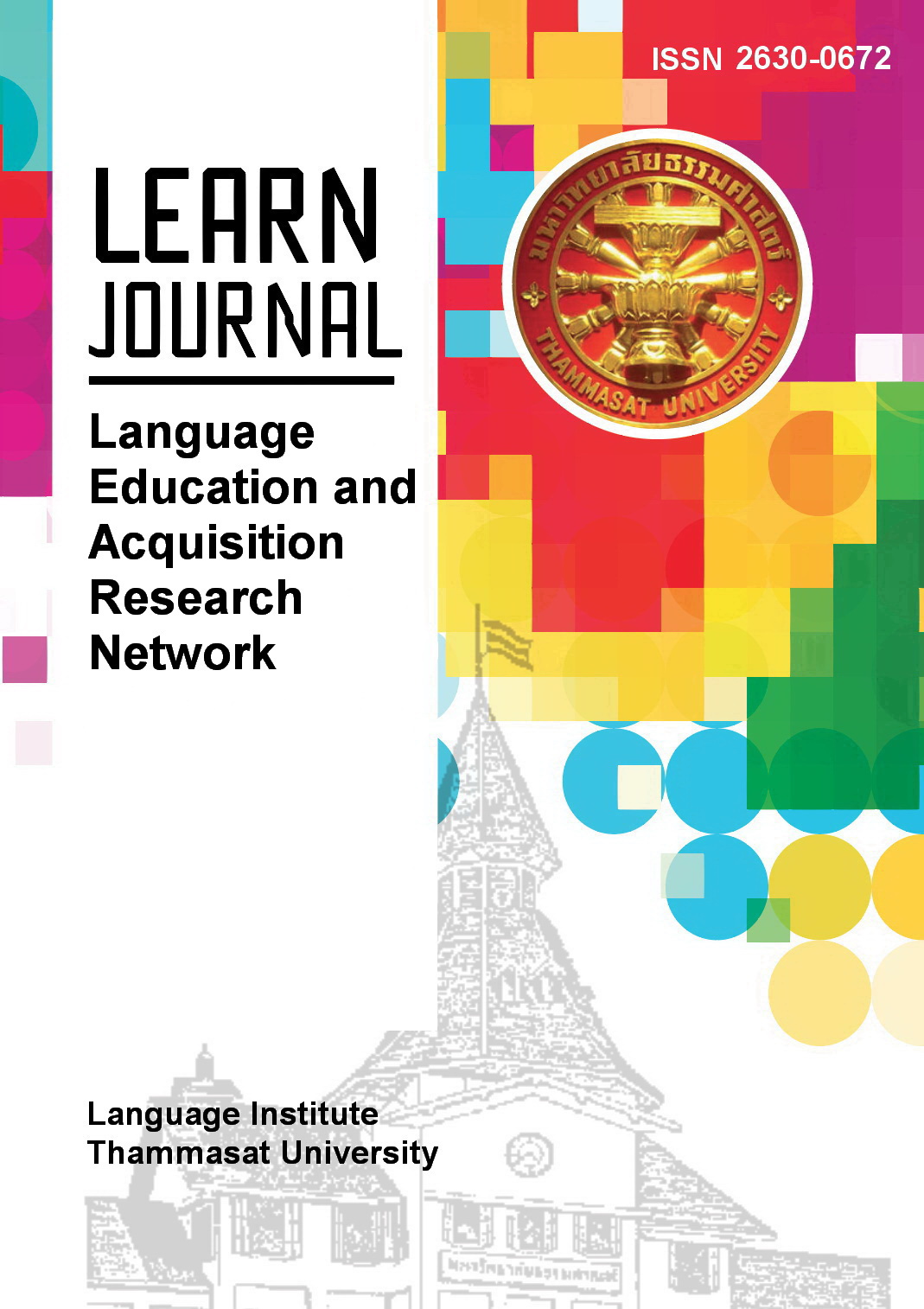Stakeholders’ Perceptions Related to Technology Acceptance of Reading Progress in Microsoft Teams: A Case Study of a Trilingual Program at a Secondary School in Thailand
Main Article Content
Abstract
This study was derived as part of collaborative projects between the Language Institute Thammasat University and Microsoft Thailand with an objective to empower English language educators and learners with innovative technologies. The aim of the study was to explore stakeholders’ perceptions related to technology acceptance of Reading Progress in Microsoft Teams. By using one Trilingual Program at a Secondary School in Thailand as a case study, this study adopted a qualitative approach to investigate technology acceptance of 9 EFL students, 2 EFL teachers, and 1 program administrator in the studied program using focus group interview data. Grounded within Technology Acceptance Model (TAM), the findings revealed that all participants perceived Reading Progress as a computer-assisted pronunciation training (CAPT) tool, with the EFL teachers and program administrator also viewing Reading Progress as a teaching assistant tool for personalized teaching and learning. The perceived usefulness resulted from the participants’ perceived ease of use of Reading Progress. However, familiarity with technology and perceived enjoyment also played a significant role in understanding technology acceptance in the studied EFL context. The study provided implications for future research in similar contexts including English language education and educational technology.
Article Details
References
AlDakhil, M., & AlFadda, H. (2022). EFL Learners’ perceptions regarding the use of Busuu application in language learning: Evaluating the technology acceptance model (TAM). English Language Teaching, 15(1), 1-15. https://doi.org/10.5539/elt.v15n1p1
Braun, V., & Clarke, V. (2006). Using thematic analysis in psychology. Qualitative Research in Psychology, 3(2), 77-101.
Chesney, T. (2006). An acceptance model for useful and fun information systems. Human Technology, 2(2), 225-235. http://dx.doi.org/10.17011/ht/urn.2006520
Davis, F. D., Bagozzi, R. P., & Warshaw, P. R. (1989). User acceptance of computer technology: A comparison of two theoretical models. Management Science, 35(8), 982–1003.
Davis, F. D., Bagozzi, R. P., & Warshaw, P. R. (1992). Extrinsic and intrinsic motivation to use computers in workplace. Journal of Applied Social Psychology, 22(14), 1111–1132. https://doi.org/10.1111/j.1559-1816.1992.tb00945.x
Denzin, N. (2006). Sociological methods: A sourcebook. Aldine Transaction.
Fitrianingsih, W. B., & Lestari, Y. B. (2023). Teachers’ adaptation to post-COVID-19 English language teaching and learning situation. In A. Amrullah et al. (Eds.), Proceedings of the 3rd Annual Conference of Education and Social Sciences (ACCESS 2021) (pp. 67-72). Atlantis Press. https://doi.org/10.2991/978-2-494069-21-3_9
Granić, A. (2023). Technology acceptance and adoption in education. In O. Zawacki-Richter & I. Jung (Eds.), Handbook of open, distance and digital education. https://doi.org/10.1007/978-981-19-2080-6_11#DOI
Hongnaphadol. W., & Attanak, A. (2022). Reducing Thai EFL students’ pronunciation anxiety through a CAPT-based reading progress application. Journal of Liberal Arts, Prince Songkhla University, 14(1), 83-122.
Hsieh, J. S., Huang, Y., & Wu, W. V. (2017). Technological acceptance of LINE in flipped EFL oral training. Computers in Human Behavior, 70, 178-190. http://dx.doi.org/10.1016/j.chb.2016.12.066
Huang, F., Teo, T., & Zhou, M. (2019). Factors affecting Chinese English as a foreign language teachers’ technology acceptance: A qualitative study. Journal of Educational Computing Research, 57(1), 83–105. https://doi.org/10.1177/0735633117746168
Kampookaew, P. (2020). Factors influencing Thai EFL teachers’ acceptance of technology: A qualitative approach. Thai TESOL Journal, 33(2), 46-69.
Krueger, R. A., & Casey, M. A. (2015). Focus groups: A practical guide for applied research. SAGE Publications.
Mizher, R., Amoush, K., & Alwreikat, A. (2022). EFL students’ attitudes towards using online learning during Covid-19: Applying technology acceptance model. Arab World English Journal (AWEJ) Special Issue on CALL, 8, 88-103. https://dx.doi.org/10.24093/awej/call8.6
Molenda, M., & Grabarczyk , I. (2022). Microsoft reading progress as CAPT tool. Research in Language, 20(2), 197–214. https://doi.org/10.18778/1731-7533.20.2.05
Neuwirth, L. S., Joviæ, S., & Mukherji, B. R. (2021). Reimagining higher education during and post-COVID-19: challenges and opportunities. Journal of Adult Continuing Education, 27, 141–156. https://doi.org/10.1177/1477971420947738
Octavo, M., & Vargas, D. (2022). Effects of the usage of Microsoft Teams in reading fluency of grade 4 pupils. SSRN. http://dx.doi.org/10.2139/ssrn.4212006
Prasetya, R. E. (2022). Utilizing Reading Progress feature in Microsoft Teams to improve speaking and listening competence of English foreign language learners. English Language Education and Literature, 7(1), 21-29.
Rofiah, N. L., & Waluyo, B. (2020). Using Socrative for vocabulary tests: Thai EFL learner acceptance and perceived risk of cheating. Asia TEFL, 17(3), 966-982. http://dx.doi.org/10.18823/asiatefl.2020.17.3.14.966
Rogers, E. (1962). Diffusion of innovations. The Free Press.
Rogers, E. (1995). Diffusion of innovations (4th ed.). The Free Press.
Ulla, B., & Perales, W. F. (2022). Hybrid teaching: Conceptualization through practice for the post COVID19 pandemic education. Frontier Education, 2022, 7, 1-8. https://doi.org/10.3389/feduc.2022.924594
Van der Heijden, H. (2004). User acceptance of hedonic information systems. MIS Quarterly, 28, 695–704. https://doi.org/10.2307/25148660
Wang, Y., Yu, L., & Yu, Z. (2022). An extended CCtalk technology acceptance model in EFL education. Education and Information Technologies, 27, 6621–6640. https://doi.org/10.1007/s10639-022-10909-9
Zou, C., Li, P., & Jin, L. (2022). Integrating smartphones in EFL classrooms: Students’ satisfaction and perceived learning performance. Education and Information Technologies, 27, 12667–12688. https://doi.org/10.1007/s10639-022-11103-7


